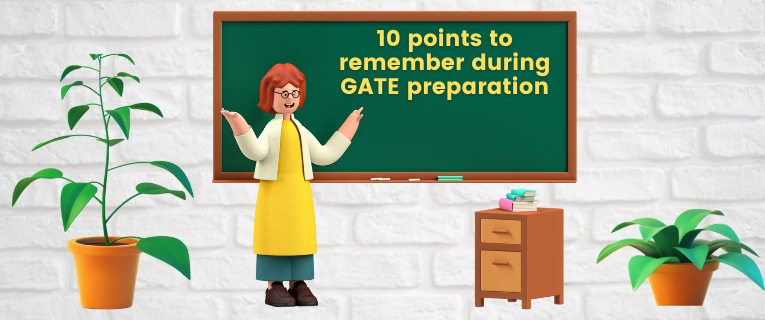GATE is one of the most prestigious and widely accepted entrance exam for mainly engineers in India. Through a good GATE score students can fulfil their aspirations in life. So, GATE preparation is no part-time venture for serious students. Students need to prepare for GATE systematically and strategically. There are 10 points a student must remember during the GATE preparation.
1. Decide Early
GATE exam preparation is a long-term commitment. Students need to acquire an in-depth knowledge of the subject to perform well in the exam. So, it is always advisable to start the preparation as early as possible. The appropriate time to start the preparation process is beginning or middle of the 2nd year of B.Tech. Because early start will give the students enough time to master the subjects.
2. Clear idea about recent GATE Exam pattern and GATE syllabus
The first step of GATE preparation is to have a definite idea about the updated GATE syllabus and the exam pattern. The Exam consists of MCQ, MSQ and numerical type of questions. There is negative marking except for the numerical type questions. It is preferable to categorize the subject matter based on the students conceptual knowledge and understanding of the subject.
3. Preparation of a study plan
An appropriate and feasible study plan is essential to ensure the success in a competitive exam like GATE. To effectively implement the plan students are advised to consider their own strengths and weaknesses. Designing a long-term, monthly, weekly and daily plan will keep the students motivated and focussed.
4. Selection of study material
A standard and updated study material is the prime requirement of any GATE aspirant. One can pick up multiple books regarding different topics for GATE preparation. But it is advisable to refer one book at a time. One can also follow the standard study materials of any standard institution instead of multiple books.
5. Solving previous year question papers of GATE
Analysis of previous years question papers will give the students a clear idea about the distribution, weightage and the difficulty level of different topics. Therefore, the students can prepare their plans accordingly. Also solving the question papers will give them enough confidence to stay focussed.
6. Improvement of concepts and problem-solving ability
GATE exam tests the conceptual subject knowledge, clear understanding of the basics, numerical problem solving ability and reasoning. To meet these requirements students need to clear all doubts regarding respective subjects and regularly solve as many numerical problems as possible. Continuous effort and methodical study can improve their efficiency and thereby the chance of getting a good score in the exam.
7. Time management
Time is the most crucial factor in GATE preparation. Therefore it is strongly recommended to make a practical timetable and utilise it efficiently in the process. Timetable should also include the time for revision and problem solving systematically.
8. Mock tests
At every stage students should appear in the chapter wise mock tests to ensure their understanding of the topic. Chapter wise mock test with chapter wise previous 10 years question paper solving will definitely increase their chance of success in GATE. Also analyzing the performance in the mock tests, students will get to know about their mistakes and improve on them.
9. Emphasise on engineering mathematics and general aptitude
Engineering mathematics section carries 13 marks and General Aptitude section carries 15 marks in GATE. Therefore, these two sections are considered to be extremely scoring in GATE. Those who excel in GATE, generally scores more than 90% in these two sections and it is a good idea to prepare well for these two sections.
10. Online Test Series
Purchasing standard and updated online test series is an excellent way to prepare for GATE exam. Those test series are prepared by expert faculty members and contain previous year questions, critical & conceptual problems and probable questions. These will help the students to analyse their strong and weak areas and work on them.

Comments